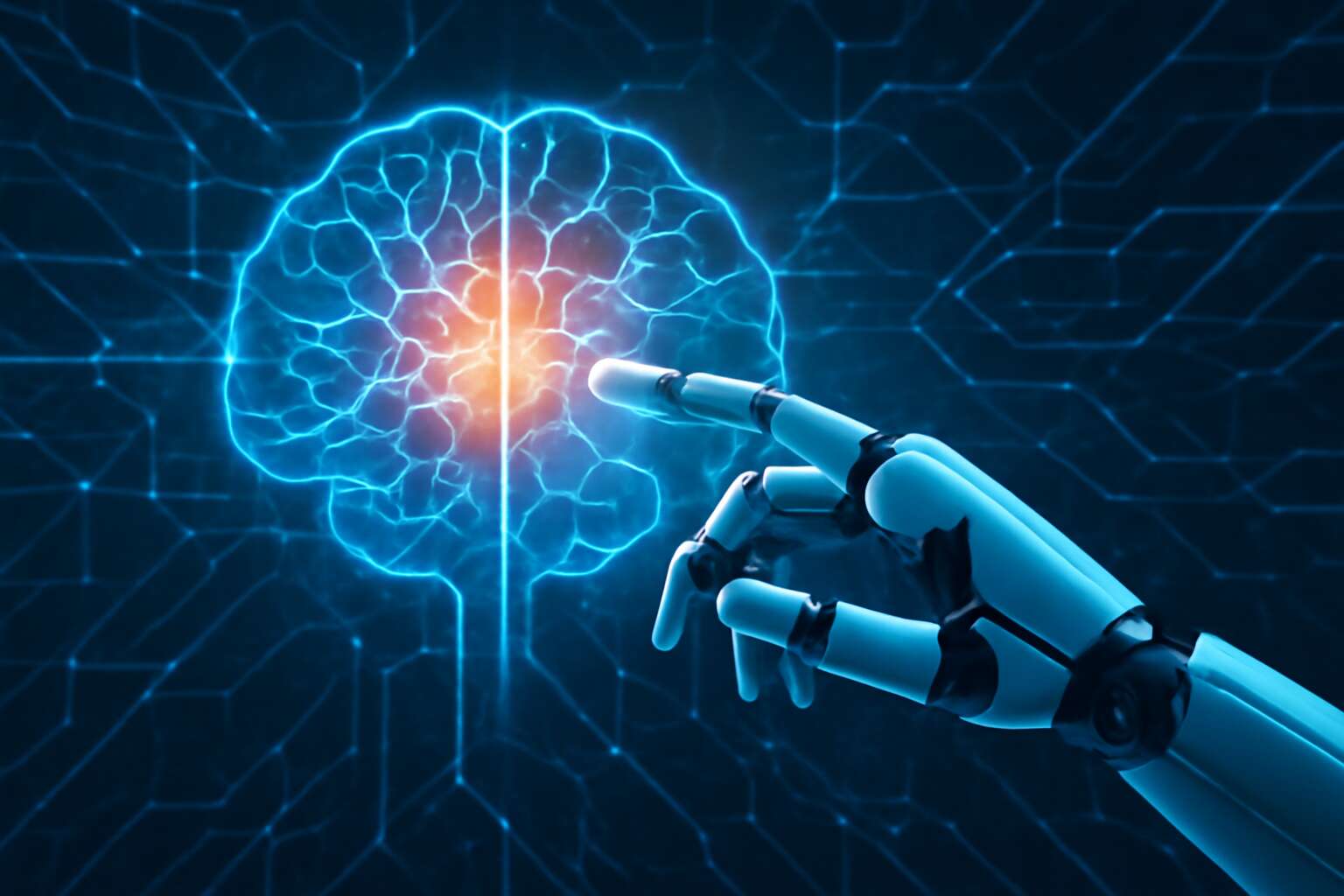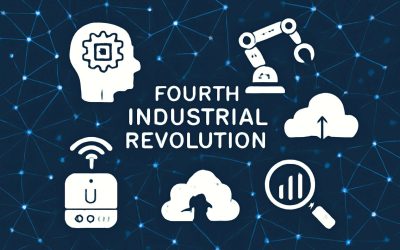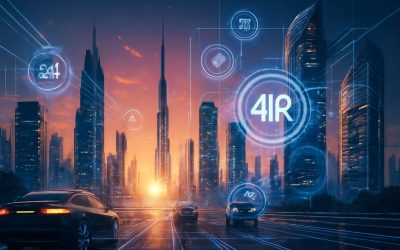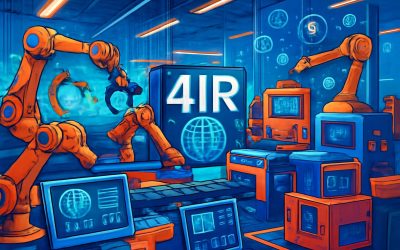Understanding the Fourth Industrial Revolution (4IR)
Overview of 4IR – Defining the Fourth Industrial Revolution and its significance
The Fourth Industrial Revolution, or 4IR, is not merely a technological shift; it is a profound metamorphosis that redefines the very fabric of society and industry. Unlike previous eras driven solely by mechanization or digitization, 4IR integrates intelligent systems that blur the boundaries between the physical, digital, and biological worlds. At its core lies artificial intelligence in the 4IR—a catalyst that accelerates innovation and reshapes economic paradigms.
Understanding the significance of 4IR requires recognizing its transformative potential. This revolution is characterized by phenomena such as automation, data analytics, and machine learning, all converging to create a landscape where human and machine collaboration becomes seamless. South Africa stands on the cusp of this wave, with artificial intelligence in the 4IR poised to unlock unprecedented opportunities, from revolutionizing industries to redefining societal norms.
- The integration of advanced robotics
- Smart infrastructure development
- Enhanced decision-making through big data
Key Technologies in 4IR – Emerging technologies shaping the 4IR landscape
As the Fourth Industrial Revolution continues to unfold, understanding the key technologies shaping this new era is essential. At the forefront is artificial intelligence in the 4IR, which is transforming industries and societal functions alike. It’s not just about smarter machines; it’s about redefining how we live and work.
Emerging technologies such as machine learning, robotics, and data analytics form the backbone of this revolution. These advancements enable systems to learn, adapt, and make decisions with minimal human input. For example, smart infrastructure development in South Africa relies heavily on artificial intelligence in the 4IR to optimize energy use and improve urban planning.
- Automation of routine tasks increases efficiency across sectors.
- Big data analytics support enhanced decision-making and strategic planning.
- Advanced robotics are now integral to manufacturing and logistics, reducing costs and increasing precision.
Understanding these technologies is crucial for grasping how the 4IR is reshaping economies and societies—especially in regions like South Africa, where innovation can drive inclusive growth and sustainable development.
Impact on Global Industries – Transformations across various sectors
Across the globe, industries are experiencing a seismic shift fueled by artificial intelligence in the 4IR. In South Africa, this transformation isn’t just about automation—it’s a catalyst for innovation and resilience. As sectors like mining, agriculture, and finance embrace these new technologies, the landscape of work and commerce is evolving at a breathtaking pace.
From predictive analytics that forecast market trends to autonomous robots streamlining logistics, the influence of artificial intelligence in the 4IR is profound. Industries are leveraging these advancements to unlock efficiencies, reduce costs, and enhance customer experiences. For instance, smart farming solutions utilizing AI-driven data analytics are revolutionizing South Africa’s agricultural output, making it more sustainable and productive.
- Manufacturing automation is increasing precision and reducing waste.
- Financial services are employing AI for fraud detection and personalized banking.
- Urban planning benefits from AI-powered smart infrastructure, optimizing energy and transportation systems.
Ultimately, understanding how artificial intelligence in the 4IR impacts global industries reveals a future where technology and human ingenuity intertwine, creating opportunities that once only existed in the realm of imagination. In this new era, the possibilities are as limitless as the innovations driving them forward.
Role of Artificial Intelligence in the 4IR
AI as a Catalyst for Innovation – How AI accelerates technological advancements
Artificial intelligence in the 4IR acts as a powerful catalyst for innovation. It transforms ideas into tangible solutions at an unprecedented rate. By automating complex processes, AI accelerates research and development, enabling industries to leap forward faster than ever before. Companies harness AI to optimize operations, reduce costs, and unlock new possibilities.
AI’s role in the 4IR extends beyond automation. It fosters the emergence of entirely new business models and enhances existing ones. For example, predictive analytics powered by artificial intelligence in the 4IR help industries anticipate market shifts and customer needs with remarkable accuracy. This agility is crucial for staying competitive in today’s fast-moving landscape.
In South Africa, where sectors like mining, agriculture, and manufacturing are vital, artificial intelligence in the 4IR offers transformative potential. By integrating AI-driven technologies, these industries can boost productivity, improve safety, and contribute to economic growth. The pace of innovation driven by AI continues to reshape regional and global markets.
Integration Across Industries – Application of AI in manufacturing, healthcare, finance, and more
Artificial intelligence in the 4IR is no longer a distant dream but a vibrant reality shaping industries with poetic precision. Its role in weaving innovation into the fabric of daily operations transforms mundane tasks into symphonies of efficiency. In manufacturing, AI-driven automation orchestrates production lines with uncanny accuracy, reducing waste and elevating precision to an art form. Meanwhile, in healthcare, artificial intelligence in the 4IR breathes new life into diagnostics, enabling early detection and personalized treatment plans that save lives.
Across finance, AI acts as a vigilant sentinel, analyzing vast data streams to forecast market trends and identify risks with remarkable clarity. Its application extends beyond automation into the realm of predictive analytics, helping industries anticipate shifts before they happen. For South Africa’s vital sectors—mining, agriculture, manufacturing—artificial intelligence in the 4IR unlocks a new era of productivity and safety.
- Enhanced operational efficiency
- Safer working environments
- Strategic market insights
These innovations are not mere enhancements but revolutionary leaps forward, charting a course toward economic resilience and global competitiveness.
AI-Driven Automation – Enhancing efficiency and productivity through intelligent automation
In the grand tapestry of the Fourth Industrial Revolution, artificial intelligence in the 4IR emerges as a luminous thread, weaving efficiency and ingenuity into the fabric of industry. At the heart of this transformation lies AI-driven automation, a symphony of smart systems that propel productivity into new realms of excellence. It’s as if machines now harbor a whisper of human intuition, orchestrating tasks with a finesse that borders on artistry.
Through intelligent automation, complex processes are streamlined with poetic precision, minimizing waste and elevating operational standards. Industries such as manufacturing and agriculture are witnessing a renaissance—where data-driven insights and autonomous systems dance in harmony. For South Africa’s vital sectors, this means safer workplaces, sharper strategic insights, and a resilient economy poised to thrive on innovation.
- Enhanced Productivity
- Reduced Operational Costs
- Optimized Resource Allocation
Artificial intelligence in the 4IR is not merely about replacing human effort but about augmenting human potential, transforming mundane routines into catalysts of growth. The future is unfolding with each keystroke of an intelligent system—an era where efficiency and creativity converge seamlessly, propelling industries into a luminous horizon of possibility.
Advancements in Artificial Intelligence Technologies
Machine Learning and Deep Learning – Core techniques propelling AI development
At the heart of the fourth industrial revolution, advancements in artificial intelligence in the 4IR are redefining what machines can achieve. Machine learning and deep learning stand out as the core techniques propelling this transformation, enabling systems to learn from vast data sets and improve autonomously. These innovative methods are not just theoretical—they’re actively shaping industries, from agriculture to urban planning, with unprecedented precision and insight.
Machine learning algorithms, for instance, analyze patterns in data to forecast trends and optimize decision-making. Deep learning, a subset of machine learning inspired by the human brain’s neural networks, drives breakthroughs in speech recognition, image analysis, and autonomous vehicles. This synergy of technologies fuels smarter automation, making processes more efficient and responsive than ever before. As a result, artificial intelligence in the 4IR is not just a tool but a catalyst for ongoing innovation, promising a future where technology seamlessly blends into daily life, empowering communities and industries alike.
Natural Language Processing – Creating human-like interactions and understanding
Natural Language Processing (NLP) stands as one of the most captivating advancements in artificial intelligence in the 4IR. It enables machines to understand, interpret, and generate human language with astonishing fidelity, blurring the line between digital and human interaction. This technology fuels chatbots, virtual assistants, and translation services, transforming the way we communicate across borders and cultures.
What makes NLP truly remarkable is its ability to create human-like interactions that feel intuitive and seamless. As AI systems become more sophisticated, they can grasp context, sentiment, and even cultural nuances—paving the way for more empathetic and effective engagement. This evolution in artificial intelligence in the 4IR is not just about automation; it’s about forging meaningful connections between humans and machines.
- Enhanced customer service through intelligent virtual agents
- Real-time language translation breaking down communication barriers
- Improved accessibility for individuals with disabilities
South Africa’s diverse linguistic landscape makes NLP a particularly powerful tool in the region, fostering inclusivity and expanding digital reach. As artificial intelligence in the 4IR advances, NLP continues to unlock new possibilities for industries eager to harness the full potential of human-like understanding.
Computer Vision – Transforming image and video analysis
Artificial intelligence in the 4IR is revolutionizing how we interpret visual data. Computer vision technology enables machines to analyze images and videos with unprecedented accuracy, transforming industries from security to retail. By recognizing patterns, objects, and movements, AI-driven systems can automate complex tasks that once required human oversight.
In sectors like manufacturing and healthcare, computer vision accelerates inspection processes, detects defects, and enhances diagnostic precision. Its ability to process vast amounts of visual information quickly makes it an invaluable tool for businesses seeking efficiency and accuracy. Here’s how it’s making a difference:
- Automated quality control in factories
- Real-time surveillance for safety and security
- Advanced medical imaging analysis
As artificial intelligence in the 4IR continues to evolve, computer vision stands out as a key driver of innovation, unlocking new possibilities for industries eager to harness the full potential of visual data analysis. South Africa’s diverse environments and complex security needs further highlight the importance of this technology in building smarter, safer communities.
Benefits of Artificial Intelligence in the 4IR
Enhanced Decision-Making – Data-driven insights for strategic choices
In the shadowy corridors of the 4IR, artificial intelligence in the 4IR emerges as a beacon of enlightenment—guiding industries through the fog of uncertainty with data-driven insights. It’s not merely about automation; it’s about transforming raw information into strategic foresight. The power of AI allows decision-makers to peer into the future, unveiling patterns hidden beneath the chaos of vast datasets, revealing opportunities and threats alike.
Enhanced decision-making through artificial intelligence in the 4IR unlocks the potential for unparalleled precision. By harnessing machine learning algorithms, businesses can anticipate market shifts or optimize resource allocation with uncanny accuracy. This strategic clarity becomes a weapon in the relentless pursuit of competitive advantage, especially in a landscape as dynamic and unpredictable as South Africa’s evolving industries. As the veil lifts, organizations wield insights like a dark sword—cutting through ambiguity to carve a path forward.
Improved Efficiency – Automation reducing operational costs
In the vibrant tapestry of South Africa’s evolving industries, artificial intelligence in the 4IR is redefining what’s possible. The magic of automation isn’t just about replacing manual labor; it’s about transforming operations into a symphony of efficiency and precision. Businesses harness AI to streamline processes, reduce operational costs, and boost productivity—turning complex tasks into seamless workflows.
Imagine a world where routine tasks are handled effortlessly, freeing human ingenuity for innovation. This is the promise of artificial intelligence in the 4IR—an engine that drives smarter, leaner enterprises. From automated supply chains to intelligent customer service, the benefits ripple across sectors, creating new opportunities while slashing expenses. The advent of AI-powered automation unlocks a frontier of endless potential, making the journey through the 4IR not just transformative, but truly exhilarating.
Innovation in Products and Services – New AI-powered offerings
Within the vibrant corridors of innovation, artificial intelligence in the 4IR is forging a new realm of product and service possibilities that once belonged to the realm of science fiction. Imagine offerings that adapt seamlessly to customer needs, or solutions that anticipate challenges before they even arise. This dynamism is the hallmark of AI-driven innovation, transforming traditional industries into hubs of futuristic excellence.
South Africa’s entrepreneurs and established enterprises alike are harnessing this wave of ingenuity through the development of AI-powered offerings such as personalized healthcare apps, intelligent financial advisory platforms, and smart manufacturing systems. These advancements don’t just improve existing services—they redefine them, creating a competitive edge that is both sustainable and scalable.
- Enhanced Customer Experiences: AI enables businesses to craft tailored interactions, making every engagement feel personal and intuitive.
- New Business Models: From subscription-based services to on-demand solutions, AI fuels the creation of innovative revenue streams.
- Operational Agility: AI-powered insights allow companies to pivot swiftly, turning data into strategic advantage in an ever-changing marketplace.
As a result, artificial intelligence in the 4IR isn’t merely a tool for automation—it’s the spark igniting a renaissance of inventive products and services that propel South Africa into a future brimming with possibility and growth.
Challenges and Ethical Considerations
Data Privacy and Security – Managing sensitive information in AI systems
While artificial intelligence in the 4IR promises unprecedented efficiency and innovation, it also introduces a labyrinth of challenges that demand careful navigation. Chief among these concerns are data privacy and security—cornerstones of trust in any digital ecosystem. As AI systems become increasingly sophisticated at processing vast amounts of sensitive information, the risk of breaches and misuse escalates, threatening both corporate reputation and individual rights.
Managing this sensitive data isn’t merely about installing firewalls; it requires a nuanced approach that balances technological safeguards with ethical considerations. For instance, robust encryption, anonymization techniques, and strict access controls are essential. However, ethical dilemmas sometimes extend beyond mere technical solutions, prompting organizations to reflect on questions like: How transparent should AI systems be about data collection? And who bears responsibility if a breach occurs? Ensuring these issues are addressed is vital for fostering sustainable growth in the realm of artificial intelligence in the 4IR.
- Implement comprehensive data governance policies to oversee data collection, storage, and sharing.
- Regularly audit AI systems for vulnerabilities that could compromise sensitive information.
- Prioritize user consent and transparency to build trust and adhere to evolving privacy regulations.
Bias and Fairness – Addressing ethical concerns in AI algorithms
In the sprawling tapestry of the 4IR, artificial intelligence stands as a double-edged sword—its shimmering promise shadowed by ethical dilemmas that challenge our core values. Bias and fairness in AI algorithms are among the most pressing concerns, threatening to deepen societal inequalities if left unchecked. When machines inadvertently perpetuate stereotypes or discriminate against certain groups, the integrity of artificial intelligence in the 4IR comes under scrutiny.
Addressing these issues requires more than technical fixes; it demands a vigilant ethical stance. Consider the following approach:
- Implementing rigorous testing for bias during the development phase
- Using diverse training data sets to ensure inclusivity
- Establishing transparent decision-making processes that allow for accountability
Such measures help create AI systems that are fair, trustworthy, and aligned with societal values. As organizations harness the power of artificial intelligence in the 4IR, they must navigate this complex terrain carefully, lest they compromise the very foundations of ethical innovation.
Job Disruption and Workforce Impact – Balancing technological progress with employment
As artificial intelligence in the 4IR continues to reshape our world, one cannot ignore the profound challenges it raises—particularly concerning job disruption and workforce impact. While technological progress fuels innovation and economic growth, it often leaves workers scrambling to keep up, threatening to widen societal divides. The automation of tasks previously performed by humans sparks a delicate balancing act: fostering progress without sacrificing livelihoods.
In South Africa, this tension is especially palpable. The rapid deployment of AI-driven automation can displace jobs across sectors, from manufacturing to services, prompting urgent questions about retraining and social safety nets. To navigate this complex terrain, organizations are increasingly adopting strategies such as:
- Investing in workforce reskilling programs
- Encouraging the development of new roles centered around AI oversight and management
- Promoting inclusive policies that ensure technological benefits reach all societal strata
Indeed, embracing artificial intelligence in the 4IR demands more than just technological innovation; it requires a nuanced understanding of its societal repercussions. Without careful consideration, the march of progress risks leaving behind those who need it most, turning a shining beacon of the future into a source of inequality and discontent.
Future Trends and Opportunities
AI and IoT Integration – Creating smarter, interconnected systems
As we look toward the horizon of the fourth industrial revolution, the integration of artificial intelligence in the 4IR is poised to redefine the way we live and work. Future trends indicate a surge in smarter, interconnected systems that leverage AI and IoT to create seamless experiences across industries. These advancements promise not only increased efficiency but also open up a wealth of opportunities for innovation in South Africa and beyond.
One exciting development is the evolution of AI-powered smart cities, where IoT sensors and artificial intelligence in the 4IR work together to optimize urban infrastructure and resource management. This interconnected approach could revolutionize traffic flow, energy consumption, and public safety. Additionally, industries such as agriculture are beginning to harness AI and IoT integration to monitor crop health and automate irrigation, leading to more sustainable practices.
Looking ahead, the potential for AI and IoT to foster new business models is vast. Companies that embrace these technologies will be able to develop AI-powered products and services that cater to a more personalized consumer experience. As these systems become more sophisticated, they will also present new challenges in data privacy and security—factors that cannot be overlooked in the race toward a smarter, more connected world.
Regulatory and Policy Developments – Shaping AI governance in the 4IR
As artificial intelligence in the 4IR continues to evolve, so too does the landscape of governance and regulation. Governments and industry leaders recognize that fostering innovation must go hand in hand with establishing robust frameworks for ethical AI deployment. In South Africa, this balance is crucial to unlocking the full potential of AI while safeguarding societal values and individual privacy.
Future trends in AI regulation are leaning towards more proactive policies that encourage responsible development. Regulatory and policy developments are shaping AI governance by emphasizing transparency, accountability, and fairness. An emerging approach involves creating adaptive legal structures that can keep pace with rapid technological advances—an imperative in the realm of artificial intelligence in the 4IR.
Various initiatives include:
- Developing national AI strategies that align with regional economic priorities
- Implementing data privacy laws tailored to AI-driven systems
- Fostering international cooperation for cross-border AI standards
Such measures are instrumental in ensuring that AI’s growth benefits all sectors of society—from agriculture to urban development—while mitigating risks associated with bias and misuse. In the vibrant corridors of South African innovation, these policies serve as the scaffolding upon which the future of artificial intelligence in the 4IR will be built, guiding the nation toward a smarter, more equitable world.
Emerging AI Applications – Prospects in robotics, autonomous vehicles, and personalized medicine
As the horizon of artificial intelligence in the 4IR expands, the horizon is brimming with transformative potential. Robotics, autonomous vehicles, and personalized medicine are emerging at a swift pace, promising to redefine everyday life and industry standards. Imagine a world where robots not only assist in manufacturing but adapt dynamically to new tasks, enhancing productivity in unprecedented ways. Autonomous vehicles are paving the road toward safer, more efficient transportation networks, reducing human error and congestion.
Meanwhile, personalized medicine is revolutionizing healthcare, tailoring treatments to individual genetic profiles and improving outcomes. These innovations are not just futuristic fantasies—they are becoming tangible realities, driven by advancements in AI algorithms that learn and evolve continuously. The prospects in AI applications extend beyond convenience; they hold the potential to address critical challenges facing South Africa, from agricultural productivity to urban health systems.
- Enhanced safety features in autonomous vehicles to mitigate accidents.
- AI-powered diagnostic tools to accelerate healthcare delivery.
- Robotic systems in agriculture to optimize crop yields and resource use.
As these applications mature, they open a window to a smarter, more interconnected society—where artificial intelligence in the 4IR acts as a catalyst for inclusive growth and innovation. South Africa’s unique landscape and societal needs make it an ideal testing ground for these cutting-edge AI advances, shaping a future where technology and human ingenuity walk hand in hand.




0 Comments